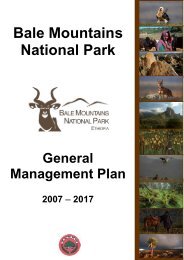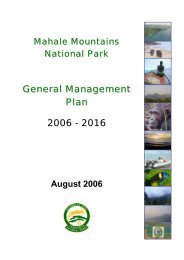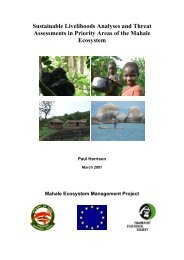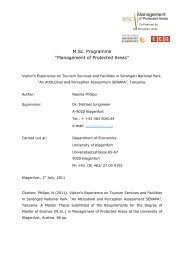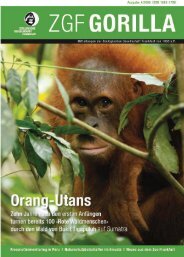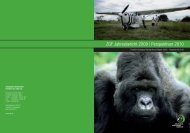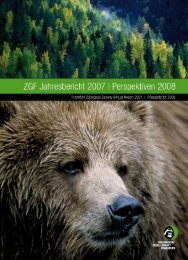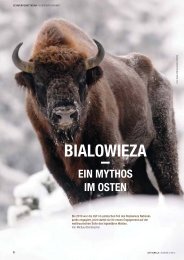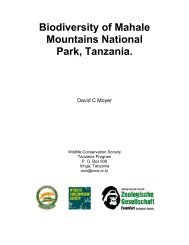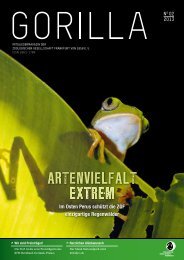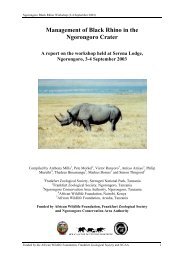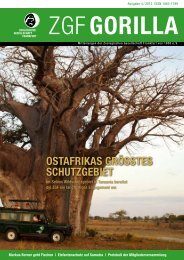Walia Special Edition on the Bale Mountains (2011) - Zoologische ...
Walia Special Edition on the Bale Mountains (2011) - Zoologische ...
Walia Special Edition on the Bale Mountains (2011) - Zoologische ...
Create successful ePaper yourself
Turn your PDF publications into a flip-book with our unique Google optimized e-Paper software.
ecosystems were degraded through rebel force occupati<strong>on</strong> and return of displaced communities into<br />
neglected Nati<strong>on</strong>al Parks and sanctuaries. The end of political suppressi<strong>on</strong> initiated countrywide<br />
ec<strong>on</strong>omic reform focussed <strong>on</strong> poverty alleviati<strong>on</strong> through improved agricultural productivity<br />
(Abrar et al. 2004). Exacerbating <strong>the</strong> envir<strong>on</strong>mental impact of political instability, this agricultural<br />
development-led industrialisati<strong>on</strong> saw large-scale c<strong>on</strong>versi<strong>on</strong> of Ethiopia’s natural forests to<br />
agricultural land for small productivity gains (Pender and Gebremedhin 2006). The government<br />
ban <strong>on</strong> private ownership of land fur<strong>the</strong>r compounded effects with uncertainty of land tenure<br />
disincentivising a largely rural populati<strong>on</strong> to maintain ecosystem quality, and farmers to invest<br />
in productivity improvements decreasing land requirements. The <strong>Bale</strong> <strong>Mountains</strong> Eco-regi<strong>on</strong><br />
exemplifies this history, providing a substantial array of ecosystem goods and services, <strong>the</strong> ec<strong>on</strong>omic<br />
values of which have ei<strong>the</strong>r not been protected or not reflected in historical management decisi<strong>on</strong>s.<br />
This misallocati<strong>on</strong> of resources and a rising populati<strong>on</strong> has resulted in widespread exploitati<strong>on</strong>,<br />
with rural communities deforesting to procure land for crops and livestock grazing (BESMP 2006;<br />
OARDB 2007).<br />
Livelihoods<br />
Primarily agro-pastoral, <strong>the</strong> <strong>Bale</strong> <strong>Mountains</strong> communities are dependent <strong>on</strong> <strong>the</strong> ecosystem for <strong>the</strong>ir<br />
livelihoods. All household members are involved in crop cultivati<strong>on</strong> through distinct land plots or<br />
home gardens. Livestock rearing, <strong>the</strong> original subsistence system in <strong>Bale</strong>, serves a variety of purposes<br />
including meat and milk products, manure, draught power, transport and skins. Livestock are also<br />
important for social status, playing a role in marriage, dispute settlement and ritual performances<br />
(BMDC 2003). Households also engage in <strong>the</strong> harvesting of forest products including firewood,<br />
materials for c<strong>on</strong>structi<strong>on</strong>, and where local c<strong>on</strong>diti<strong>on</strong>s allow, forest h<strong>on</strong>ey and coffee. This study<br />
defines forest products as <strong>the</strong> array of natural products that can be harvested from natural areas and<br />
includes products that are not explicitly found in forested areas.<br />
Ec<strong>on</strong>omic value<br />
This study takes a utilitarian definiti<strong>on</strong> of value where preferences are held for different market and<br />
n<strong>on</strong>-market goods, and trade-offs made between goods in <strong>the</strong> pursuit of maximum wellbeing reveal<br />
<strong>the</strong> values held for each good (Freeman 2003). In a m<strong>on</strong>etary metric, this translates to <strong>the</strong> c<strong>on</strong>sumer’s<br />
willingness-to-pay for a particular benefit, or in some cases willingness-to-accept compensati<strong>on</strong><br />
for a loss. Under this anthropocentric approach, envir<strong>on</strong>mental values can be classified within <strong>the</strong><br />
framework of total ec<strong>on</strong>omic value (Pearce and Warford 1993) and within this framework <strong>the</strong> <strong>Bale</strong><br />
<strong>Mountains</strong> Eco-regi<strong>on</strong> provides many ecosystem goods and services (Table 1).<br />
These values extend to many beneficiaries in multiple forms and <strong>the</strong>re is no clear boundary<br />
for ec<strong>on</strong>omic valuati<strong>on</strong> in <strong>the</strong> <strong>Bale</strong> <strong>Mountains</strong> Eco-regi<strong>on</strong>. This study c<strong>on</strong>centrates <strong>on</strong> <strong>the</strong> annual<br />
direct c<strong>on</strong>sumptive use value derived by <strong>the</strong> local communities, recognising that o<strong>the</strong>r sources<br />
of value are likely to be c<strong>on</strong>siderable. Reliant <strong>on</strong> <strong>the</strong> ecosystem for <strong>the</strong>ir livelihoods, <strong>the</strong>se local<br />
communities will first experience <strong>the</strong> rising costs of ecosystem degradati<strong>on</strong> and are also those most<br />
heavily impacted by future policy change and management in <strong>the</strong> regi<strong>on</strong>.<br />
<str<strong>on</strong>g>Walia</str<strong>on</strong>g>-<str<strong>on</strong>g>Special</str<strong>on</strong>g> <str<strong>on</strong>g>Editi<strong>on</strong></str<strong>on</strong>g> <strong>on</strong> <strong>the</strong> <strong>Bale</strong> <strong>Mountains</strong> 184



